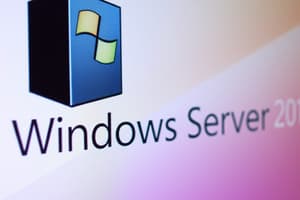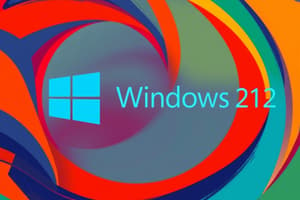Podcast
Questions and Answers
Which operating system dominates about 80% of the server market?
Which operating system dominates about 80% of the server market?
- MacOS Server
- Windows Server
- Unix-Based
- Linux-Based (correct)
What is a key feature of server operating systems?
What is a key feature of server operating systems?
- Advanced security features (correct)
- Graphical user interface
- Single-user support
- Limited access to resources
Unix-based systems are the most common type of server operating systems.
Unix-based systems are the most common type of server operating systems.
False (B)
What main architectural model do server operating systems support?
What main architectural model do server operating systems support?
What is one benefit of Windows Server's Active Directory?
What is one benefit of Windows Server's Active Directory?
Linux is favored for its ______ nature.
Linux is favored for its ______ nature.
What virtualization capabilities does Windows Server offer?
What virtualization capabilities does Windows Server offer?
Match the following server operating systems with their key features:
Match the following server operating systems with their key features:
What is a common issue with Windows Server that requires careful maintenance?
What is a common issue with Windows Server that requires careful maintenance?
Server operating systems are built to handle bigger tasks and manage many users at once, unlike operating systems we use on personal ______.
Server operating systems are built to handle bigger tasks and manage many users at once, unlike operating systems we use on personal ______.
A server operating system acts as the main hub for managing users, enforcing security measures, and handling administrative ______.
A server operating system acts as the main hub for managing users, enforcing security measures, and handling administrative ______.
Server operating systems include strong ______ features to protect sensitive information and prevent unauthorized access.
Server operating systems include strong ______ features to protect sensitive information and prevent unauthorized access.
They can adjust resources as needed, making it easier to handle increasing business ______ and workloads.
They can adjust resources as needed, making it easier to handle increasing business ______ and workloads.
Server operating systems support various types of servers, such as web servers, mail servers, file servers, and ______ servers.
Server operating systems support various types of servers, such as web servers, mail servers, file servers, and ______ servers.
Linux distributions dominate about 80% of the server market because they are ______, open-source, and highly customizable.
Linux distributions dominate about 80% of the server market because they are ______, open-source, and highly customizable.
Windows Server holds about 20% of the market share and is known for its familiar ______.
Windows Server holds about 20% of the market share and is known for its familiar ______.
Unix and Unix-like systems provide stability, security, and strong ______ features.
Unix and Unix-like systems provide stability, security, and strong ______ features.
Windows Server provides tools for centralized administration and enforcing ______, making it easier to oversee complex IT systems.
Windows Server provides tools for centralized administration and enforcing ______, making it easier to oversee complex IT systems.
Microsoft usually provides ______ years of support for each Windows Server version, ensuring stability and security.
Microsoft usually provides ______ years of support for each Windows Server version, ensuring stability and security.
Study Notes
Understanding Server Operating Systems
- Server operating systems serve as the backbone for IT infrastructures, supporting websites, databases, and email services.
- Unlike personal computer operating systems, server OSes are optimized for larger tasks and multiple simultaneous users.
- Functionality includes managing complex networks, ensuring smooth operations, and maintaining high security.
Client-Server Architecture
- Server OSes support the client-server model, responding to requests from multiple user devices (clients) effectively.
- Designed for multi-user access, they provide secure and efficient distribution of resources based on user needs.
Multi-User Support
- Built primarily for multi-user scenarios, enabling simultaneous access while maintaining security for each user account.
Advanced Security
- Strong security features are inherent, safeguarding sensitive information and protecting against unauthorized access.
Scalability
- Server operating systems can dynamically allocate resources to manage increasing business demands and workloads, ensuring adaptability as firms grow.
Common Server Operating Systems
-
Linux-Based Systems:
- Dominating approximately 80% of the market, they are free, open-source, and highly customizable with excellent security features.
- Popular distributions include Ubuntu Server, Debian Server, and CentOS, valued for their cost-effectiveness and lack of user-based licensing.
-
Windows Server:
- Holds around 20% of the market, celebrated for its user-friendly interface and compatibility with numerous business applications.
- Notable features include:
- Enterprise Management for centralized administration and policy enforcement.
- Strong virtualization capabilities through Hyper-V for efficient hardware resource utilization.
- Integrated Active Directory for user management and security across networks.
- Long-term support lasting approximately 10 years per version, ensuring stability and security.
- Potential downsides include higher costs due to user-based licensing and increased vulnerability to security threats.
-
Unix-Based Systems:
- Include FreeBSD and macOS Server, providing strong stability, security, and networking features, suited for specialized enterprise needs.
Considerations for Choosing a Server OS
- Factors influencing selection include cost, technical expertise, specific application requirements, and existing infrastructure.
- The open-source nature of Linux makes it appealing for budget-conscious organizations, while Windows Server offers robust enterprise management capabilities.
Key Differences from Desktop Operating Systems
- Server OSes prioritize stability, security, and coordination among system components, unlike desktop systems which focus on user experience.
Overview of Server Operating Systems
- Foundation of modern IT used for websites, databases, and email services.
- Different from personal computer OSes; designed for larger tasks, multi-user management, and complex networks.
- Essential for smooth, secure, and scalable IT operations in businesses of all sizes.
Understanding Server Operating Systems
- Client-Server Architecture: Supports requests from multiple users and devices simultaneously, ensuring efficient operation.
- Multi-User Support: Manages multiple user accounts with secure resource allocation based on individual needs.
- Advanced Security: Equipped with strong security features to protect sensitive data and prevent unauthorized access.
- Scalability: Adjusts resources dynamically to handle growing business demands.
Common Server Operating Systems
- Linux-Based: Dominates 80% of market share due to being free, open-source, customizable, and secure. Popular distributions include Ubuntu Server, Fedora, and CentOS.
- Windows Server: Holds 20% market share, known for user-friendly interface and compatibility. Suitable for various business applications but comes with user-based licensing costs.
- Unix-Based: Includes FreeBSD and macOS Server, offering stability and robust networking features ideal for specialized applications.
Windows Server Features
- Enterprise Management: Tools for centralized administration help manage complex IT systems.
- Virtualization Capabilities: Hyper-V enhances hardware resource utilization and scalability.
- Active Directory: Simplifies user management and security controls across networks.
- Long-Term Support: Typically offers 10 years of support for versions, ensuring stability and security.
Linux Advantages
- Diverse Distributions: Offers a wide range from user-friendly to enterprise-grade options.
- Cost-Effective: Most distributions are free, reducing licensing costs significantly.
- Customizability: Open-source nature allows extensive customization for specific business needs.
- Security and Stability: Known for strong security features and stability, suitable for mission-critical applications.
Unix-Based Operating Systems
- UNIX: Offers multi-user capabilities and built-in TCP/IP support for enterprise-level networking.
- FreeBSD: A Unix-like OS with comprehensive systems suitable for web servers and firewalls.
- macOS Server: Integrates well with Apple hardware and manages iOS devices effectively.
- NetWare: Used in legacy corporate networks for file sharing and printing.
Choosing the Right Server OS for Small Businesses
- Budget Considerations: Evaluate licensing fees, support costs, and hardware requirements to determine the total cost of ownership.
- Technical Expertise: Assess your team’s familiarity with OS options and availability of skilled administrators.
- Scalability: Select an OS that accommodates future growth in users and services.
- Application Compatibility: Ensure chosen OS supports necessary applications for business operations.
Server OS for Medium and Large Enterprises
- Current Infrastructure Assessment: Review existing systems and network requirements for compatibility.
- Scalability Requirements: Choose an OS that efficiently manages future growth in workload and users.
- Virtualization Needs: Opt for an OS with strong virtualization features to optimize resource utilization.
- Support and Security: Prioritize OS options offering robust vendor support and regular security updates.
Conclusion on Choosing a Server OS
- Assess Your Needs: Evaluate scalability, security, and specific application requirements effectively.
- Consider Total Cost: Look beyond initial licensing costs to include long-term maintenance and support expenses.
Studying That Suits You
Use AI to generate personalized quizzes and flashcards to suit your learning preferences.
Description
This guide explores the essential concepts of server operating systems, highlighting their unique features compared to personal operating systems. It covers various types, their capabilities for managing multiple users, and offers insights on selecting the ideal server OS for different business needs. Ideal for both small and large businesses, this resource will enhance your understanding of IT infrastructure.




